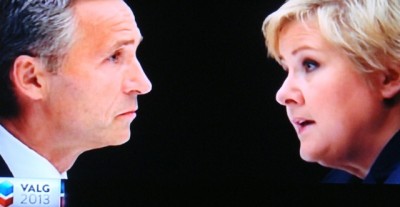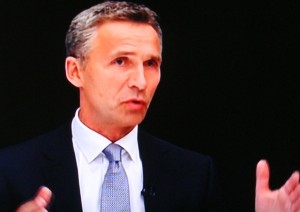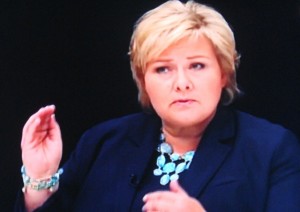It was billed as a “duel” over “your next prime minister:” Norway’s national commercial television channel TV2 helped kick off the government election campaign with a live debate between Prime Minister Jens Stoltenberg and Erna Solberg, the leader of the Conservative Party who’s keen to take over his job. Stoltenberg seemed to win the Twitter vote, even though Solberg is crushing him in public opinion polls.

Comments from social media users that ran along the bottom of TV2’s screen seemed to defy Solberg’s strong standing in the pre-election polls: “Erna go home!” and “I’ll stick with secure Jens” were typical of those tweeted during the hour-long debate as Stoltenberg and Solberg squared off over how to manage the economy, health care, police and the schools. Stoltenberg, recovering from eye surgery on Tuesday that had forced postponement of the debate from Wednesday to Thursday, raised many of the issues he had earlier in the day when he held his annual pre-summer press conference in the garden of the prime minister’s residence.

“The biggest mistake we can make is to think it (the economy) will always go well in Norway,” Stoltenberg said. A social economist by trade, he’s been warning of an economic downturn since the finance and euro crises began. Now, with Norway’s low unemployment rate starting to inch up and economic growth slowing down, Stoltenberg claims it’s more important than ever to refrain from spending too much of the country’s oil revenues and to keep government spending in check.
It’s a bit of a paradox for a Labour Party leader to be urging restraint while the Conservatives leader seems keen on more spending (or “investment,” as the non-socialist parties call it), but Norway is annerledes (different). Stoltenberg drew an historic parallel, claiming that it was a Labour government that had to “clean up” after the Conservatives held government power in the 1980s. That’s what led to jappetid (the consumption-oriented yuppie generation), less regulation and the country’s bank crisis, Stoltenberg said. Now, with new economic crisis in Europe and threatening Norway, Stoltenberg cautioned that “it’s easy to make management mistakes.” He fears Solberg’s new alliance with the even more conservative Progress Party, which urges much more use of Norway’s oil revenues to fund infrastructure improvements and welfare programs, will lead to “irresponsible” economics.

Wrong, claimed Solberg, arguing that “it’s not how much money we use, but how we use it.” She claimed Stoltenberg’s government “came to a well-set table” when it won government power in 2005 after four years of a center-right government coalition of which she was a member. And she linked the economic success of the Stoltenberg government’s last eight years to historically high oil prices, not his management. While Stoltenberg could point to creation of more than 300,000 jobs during his tenure as prime minister, the vast majority of them in the private sector, Solberg claimed that “not so many” of them have been created since 2009. She maintained that Norway has lost its competitiveness in recent years, and now unemployment is rising.
Given Norway’s strong economy during the Stoltenberg years, its consistent growth and repeated rankings as one of the best countries in the world in which to live, it’s not easy for Solberg to criticize her rival’s politics and leadership. She must do so, however, and her party has enjoyed months of strong voter support in the polls, perhaps fueled by a nationwide need for change. The debate with Stoltenberg touched on only a few of their differences on specific positions: She wants to phase out Norway’s fortune tax on individuals’ and companies’ net worth, Stoltenberg wants to retain it. She wants to start issuing grades in elementary school from the age of nine, Stoltenberg wants to maintain Norway’s practice of not attaching grades to students’ work until they reach junior high school. She wants to see more use of private health care providers to reduce waiting lists at Norway’s state-run hospitals, Stoltenberg fears that will weaken Norway’s public health care system.
Otherwise their debate, which mostly involved them speaking directly to one another without much intervention from TV2’s program host, was professional and respectful, characteristic of Norway politics. There’s not much noisy debate and things rarely get personal in Norway. Stoltenberg was asked at the outset how he was feeling after his eye operation, however, and he replied he was doing well. He didn’t use the sunglasses he’d worn during his morning session with the press corps, despite the glare of the TV lights.
Views and News from Norway/Nina Berglund
Please support our news service. Readers in Norway can use our donor account. Our international readers can click on our “Donate” button:

